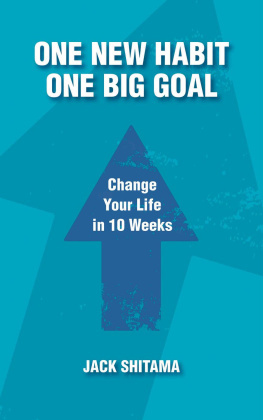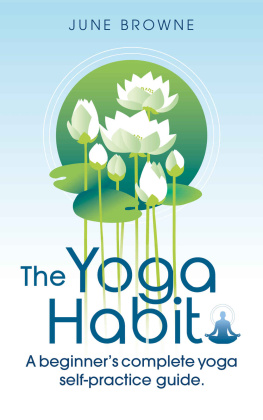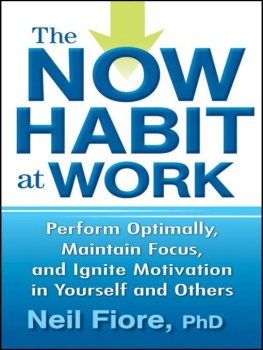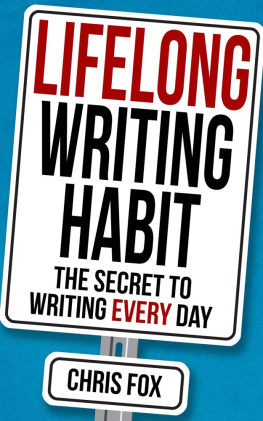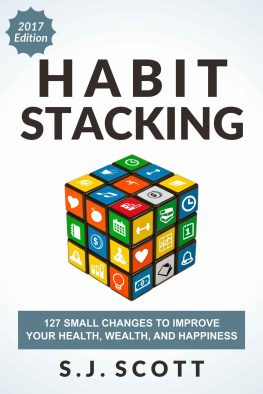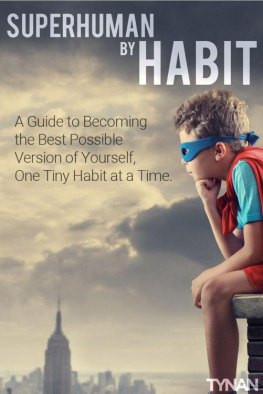One New Habit, One Big Goal: Change Your Life in 10 Weeks
Jack Shitama
Published by Charis Works Inc, 2018.
2018 by Charis Works, Inc.
All rights reserved. No part of this book may be reproduced in any form or by any electronic means, including information storage and retrieval systems, without permission in writing from the publisher, except by reviewers, who may quote brief passages in a review.
Published by Charis Works, Inc. in Earleville, Maryland.
Book cover and interior designed by Claire Purnell Graphic Design
Author photograph by Erin Shitama
ISBN 978-1-7320093-5-6 (Ebook)
ISBN 978-1-7320093-7-0 (Paperback)
ISBN 978-1-7320093-8-7 (Audiobook)
Also by Jack Shitama:
Anxious Church, Anxious People:
How to Lead Change in an Age of Anxiety
I am an ordinary person . What I share in this book is for ordinary people like me. If that's you, this book can help you greatly improve your spiritual, physical and professional life. It is not complicated. The system I lay out is straightforward and easy to follow. The most important part is your willingness to focus for a short period of time: 10 weeks. Once you learn how to do this, you can continually repeat the process to become your best self.
Since this is a quick read, I suggest you read the book completely before you try to implement the system. Then go back to chapter 5 and follow each step to develop your first 10-week plan. Use chapter 6 as a resource to guide you as you execute your plan. You can get a free planning worksheet and tracking calendar at www.thenonanxiousleader.com/one-new-habit-planner .
This book is the first in a series of books designed to help leaders of congregations and nonprofits do their best work. I started with this subject because it impacts every area of life. You are more likely to be a non-anxious leader if you are spiritually and physically fit. You will accomplish more if you know how to set goals and achieve themand this will reduce your anxiety. The simple process that I share can get you there.
Blessings to you on your journey.
Chapter 1: The Myth of Self-Discipline
W e first make our habits . Then our habits make us.
John Dryden
I am undisciplined. Ive known this all my life but have tried to ignore it. When I compare myself to John Wesley, the founder of Methodism, I feel like the slacker that I am. Wesley typically arose at 4:00 a.m., began every day with prayer, and accomplished more in one day than most of us achieve in a week.
According to one account [1] , Wesley traveled 5,000 miles per year by horseback and preached not less than 15 sermons per week. He journaled daily and kept a diary that marked his activities by the hour. He fasted twice a week. In between his daily routines, his travel, and his preaching, Wesley managed to write prodigiously, visit from house to house, oversee the establishment of schools and chapels, and raise funds to care for those in need.
Wesley was methodical. Thats actually where the term Methodist came from. It was not meant originally to be a compliment. But Wesleys methodical ways were powerful.
Maybe you also believe you are undisciplined. You tell yourself that if you tried harder or had more willpower, you would grow spiritually, eat better, exercise, and accomplish more.
Heres the problem: Self-discipline is not about trying harder. The truth is, self-discipline or, more correctly, willpower, is an exhaustible resource.
A now famous experiment in 1996 by Roy Baumeister and his Case Western Reserve University colleagues demonstrates this [2] . They subjected participants to the aroma and presence of freshly baked chocolate chip cookies. Some of the participants were allowed to eat the cookies. Others were told they could not and were told to eat radishes instead (these participants were not happy).
Both sets of participants were then asked to go to another room for what seemed to be an unrelated challenge. There they were asked to solve a puzzle. What they didnt know was that the puzzle was unsolvable.
The result?
The radish-eaters made fewer attempts and spent less than half the time attempting to solve the puzzle compared to the cookie-eaters or to the control group, who had faced neither cookies nor radishes.
The conclusion of this experiment is that self-discipline, self-control and willpower are exhaustible resources. The more you use them, the less you have available. The students who had used their willpower to abstain from eating chocolate chip cookies had less willpower available to apply toward solving the puzzle.
In their book The ONE Thing: The Surprisingly Simple Truth Behind Extraordinary Results , Gary Keller and Jay Papasan list the factors that can deplete your willpower [3] :
- Implementing new behaviors
- Filtering distractions
- Resisting temptation
- Suppressing impulses
- Taking tests
- Trying to impress others
- Coping with fear
- Doing something you dont enjoy
- Selecting long over short-term rewards
This explains why you cant resist that quart of ice cream or bag of chips after youve had a taxing day.
The authors go further and contend that self-discipline is not something that is available at our beck and call. So if you think you are not self-disciplined, youre not alone. Sometimes we have self-disciplinewhen our willpower hasnt been depleted. Other times we don't.
Heres the key: People who get the results they want arent more self-disciplined than others. What they are able to do is concentrate their efforts long enough to develop a positive habit. Once that habit is developed, they are able to do it without thinking and without depleting their willpower. Then they do it again to add another positive habit.
If you apply this process to your life, you will be doing amazing things without depleting much of your willpower at all. This leaves much more willpower available to deal with the many challenges that each day brings.
We can apply this process to our spiritual lives. Prayer, meditation, reading scripture, and journaling are habits that, when developed, keep us focused on what really matters. Thats a must for effective leaders.
We can apply this process to our professional lives, too. Reading, writing, research, sermon preparation, planning, and learning new skills are habits that can boost our productivity tremendously.
We also can apply this process to our physical lives. Eating right, exercising, flossing, and drinking plenty of water are habits that will help us feel better, live longer, and work more effectively.
Keller and Papasan maintain that research supports the idea that it takes an average of 66 days to develop a new habit [4] . They caution against trying to develop more than one habit at a time. Focus on just one until it really becomes a habit, and it will no longer require any willpower. Youll just do it! (That would make a great slogan.) Then you can focus on a new habit.

